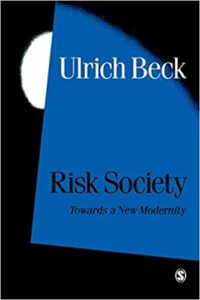In a matter of weeks, reality has lost its familiar form. Invisible threats fill the air, smearing door handles and packaging, reshaping even the most minor intimacies — the touch of an arm or a whiff of cologne — into potential risks. While measures to contain the virus echo previous pandemics, our understanding of the current crisis has a particularly modern form.
 With uncanny prescience, German sociologist Ulrich Beck described that understanding in his 1992 book, Risk Society. The Chernobyl nuclear disaster still a recent memory, Beck discerned previously unimaginable risks growing in tandem with industry, endangering humankind. Modern risks, he claimed, differ from others in their lack of an immediate, personal quality. These are not workplace accidents or perils at sea; these risks are intangible — the very air we breathe, the food we consume, the water we drink now a conduit for harm we cannot see or feel.
With uncanny prescience, German sociologist Ulrich Beck described that understanding in his 1992 book, Risk Society. The Chernobyl nuclear disaster still a recent memory, Beck discerned previously unimaginable risks growing in tandem with industry, endangering humankind. Modern risks, he claimed, differ from others in their lack of an immediate, personal quality. These are not workplace accidents or perils at sea; these risks are intangible — the very air we breathe, the food we consume, the water we drink now a conduit for harm we cannot see or feel.
Beck saw a “shadow kingdom” of risk lurking behind the everyday visible world. No longer visible to the naked eye, these risks require scientific knowledge to be understood. Without it, we can’t, for instance, grasp the implications of lead in our drinking water. A sense of inadequacy at grasping the threat ensues.
For some, Beck observed, the suspicion grows that scientists tell only partial truths, that they have been bought by industry or biased by politics. This distrust in science leaves a vacuum easily filled with misinformation, often with harrowing consequences, as recent experiments with virus home cures have shown.
The affluent and well-educated tend to be the most informed, changing their habits to minimize risk and, in a pandemic, escaping cities, navigating a new health care landscape, accumulating supplies, and seamlessly moving their work online. For those less fortunate, the visible risk of hunger still takes precedence over these new invisible threats. Many Americans must show up for work without proper protection against the virus, health insurance, increased pay, or child care as schools and day-care centers close. A lost income is still the bigger danger.
But Beck saw that when the side effects of modern industry include threats to humankind, with nuclear and climate catastrophes only the most dramatic of examples, everyone is vulnerable. The goal becomes safety and the shared experience fear: “the commonality of anxiety takes the place of the commonality of need.” This prompted his most relevant question for the present moment: “Can intangible, universal afflictions be organized politically at all?”
Strikes over working conditions at Amazon, Whole Foods, and Instacart offer promising signs of unity. Nonprofit groups offering food to those in need have formed all over the country, including here on Cape Cod. But broader acts of solidarity, cutting across both national and class lines, are harder to find.
The global movement on climate action is promising in its fight against the risks of modernization. But climate change remains an impending catastrophe more than an immediate threat, at least for now. The pandemic reveals, in the starkest terms, how society can look when the catastrophe turns from potential to actual. Power grabs in Hungary and elsewhere reveal the extent of the danger. Living under a state of emergency becomes the norm. Privacy laws about cell phones, carefully protected for many years, are suddenly a hindrance. Many praise the Chinese government for its authoritarian measures. Under the guise of risk prevention, anything now seems possible.
If the present catastrophe is a hallmark of the modern age, the gravest danger, though it may not seem obvious at the moment, is that we come to distrust science and look to authoritarianism. Some democracies have already been weakened by their failure to deal with this crisis. Whether our own will survive it remains to be seen.



